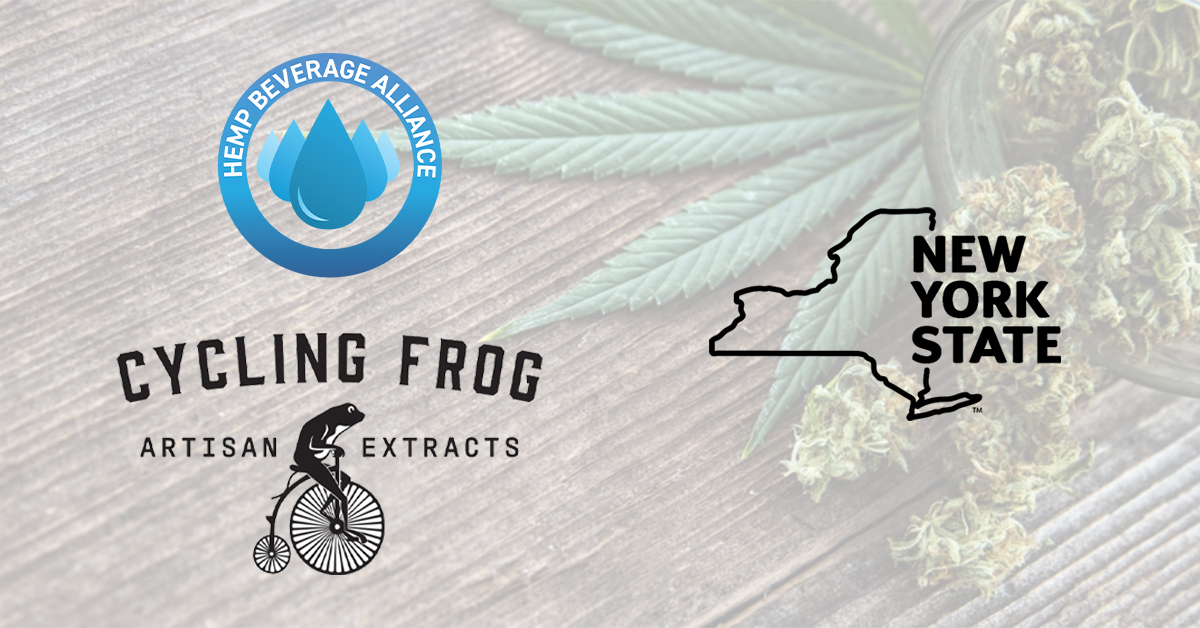Cannabinoid seltzer brand Cycling Frog and the Hemp Beverage Alliance are taking the New York State’s Office of Cannabis Management (OCM) to court seeking an injunction of the regulatory body’s “ill-conceived emergency regulation” prohibiting the sale of hemp-derived THC products in stores.
The Article 78 special proceeding filed in the Albany County Supreme Court on Friday is attempting to “temporarily, preliminarily and permanently” stop the emergency regulations pertaining to the production and sale of hemp products in the state. The suit contends that the regulations are in violation of the states Marihuana Regulation and Taxation Act of 2021 and are “arbitrary, capricious, without a rational basis and an abuse” of the OCM’s directives.
The OCM’s regulations prohibit the sale of hemp products with a CBD-to-THC ratio over 15:1, while ingestible products and tinctures are limited to 10mg total THC per package with no more than 1mg THC per serving and products containing more than 0.5mg total THC per serving cannot be sold to those under 21.
Moving the goalposts means most brands are effectively locked out of the market, Cycling Frog partner and head of brand Jason Peterson told BevNET on Tuesday.
“Basically with the stroke of a pen they just destroyed that entire (hemp-derived THC) industry and made it illegal.”
The Hemp Beverage Alliance (HBA) – in one of its first major oppositions to state hemp regulation – joins New York retailer One Stop Brew Shop, distributor Sarene Craft Beer and Cycling Frog, the lead plaintiff in a case, to argue that the OCM has no scientific or anecdotal evidence that the emergency regulations are necessary to properly regulate the state’s hemp industry.
A hearing has been set for August 25 to decide if an injunction should be put on, what Peterson calls, the OCM’s “draconian” emergency regulations before the issue can be addressed more broadly during a 90-day public comment period.
“We want to be collaborative with the OCM,” said Christopher Lackner, HBA executive director. “We all want a well regulated beverage industry. We all want standardization in the product.”
The plaintiffs in the case said that the New York Cannabis Control Board, which provides advisory oversight of the OCM, passed the emergency regulation barring the sale of hemp without debate or discussion with the public or stakeholders in the industry. Lawyers for Cycling Frog filed the motion on August 5 for the OCM to show cause for the regulations.
Regardless of the result on August 25, the Hemp Beverage Alliance in conjunction with its 60-member base (including Cycling Frog) will participate in a “heavy lobbying and PR push to influence and provide feedback and guidance” on fair and meaningful regulation for hemp-based food and beverages, Peterson told BevNET Tuesday.
Peterson contends that the OCM has created a recreational cannabis regulatory framework that is “very restrictive and very tax heavy” and favors multi-state operators who maintain a tight grip on the market.
“What you’re seeing in states that have followed this playbook – such as Colorado and California – is actually a declination in profitability of cannabis,” he said. “Ultimately, what we feel is going to happen is it’s going to put a bunch of hemp brands out of business in the state of New York. It’s going to make cannabis and full spectrum hemp products significantly less available, which is going to impact the consumer dramatically.”
The HBA believes that beverages containing hemp-derived THC and/or CBD should be regulated like alcohol with age-restrictions, similar tax structures and, most importantly, be sold in the same places as alcohol.
“You don’t go to a dispensary to buy your beverages,” Lackner said. “Beverages are occasion-focused and they are usually purchased in retail or liquor stores and we see a place for low dose, hemp-derived THC beverages to be alongside beer and wine in New York.”
The organization points to the 2018 Farm Bill that federally legalized hemp and hemp-derived products as the legal basis for being able to sell hemp beverages in the same retail locations as beer, wine and spirits.
One of the biggest challenges to fighting a case like this is educating a governmental regulatory body about the difference between low-dose, hemp-derived THC products like seltzers or alcohol-free cocktails and other cannabis products. Restricting the sale of these products will force consumers to turn to the black market for hemp-derived THC products where there is no regulation nor is there the tax-benefit to the state, Peterson said.
“I don’t think that there’s a full understanding and appreciation to how much in demand these products are, how well regulated they are and how they are providing a significant public benefit by helping folks that want to reduce their alcohol consumption,” Lackner said.
